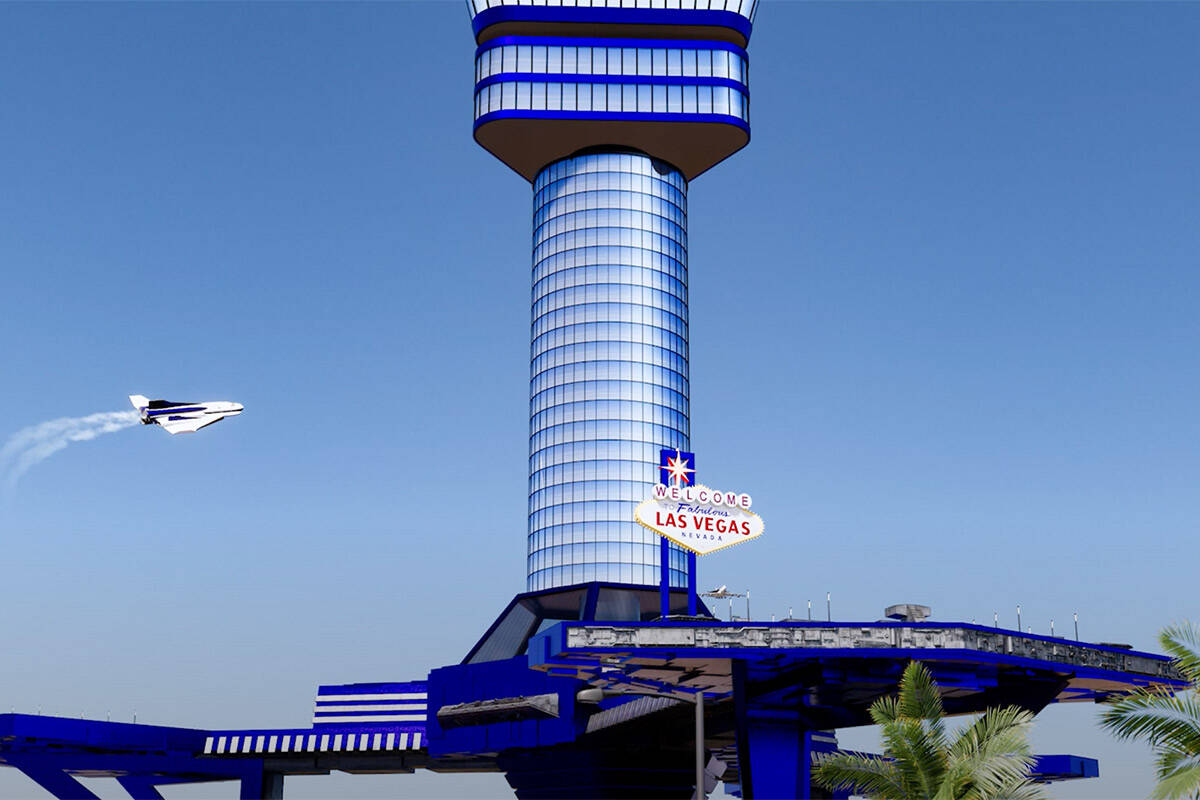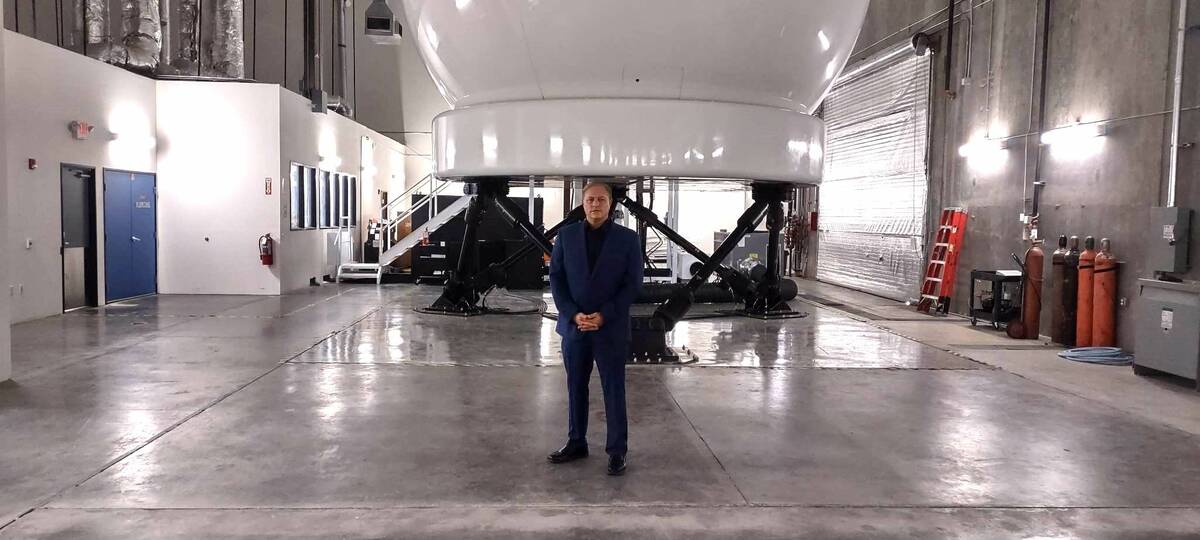The next frontier of tourism: Las Vegas Spaceport proposed west of city
Just off a dusty desert road dotted with Joshua trees and scrub, Las Vegas commercial real estate developer Rob Lauer envisions a private spaceport on 240 acres in Clark County.
On Tuesday, he began soliciting investors to raise $310 million to build a launching pad, a runway for spaceplanes, a control tower, a flight school and a 200-room casino resort between Las Vegas and Pahrump. It’s a crowdsourcing effort to build an escrow account that eventually would lead to the formation of a publicly traded company to build Las Vegas Spaceport.
“I own the land, bought it in November, and have been working on a concept for about a year,” Lauer said in an interview with the Las Vegas Review-Journal. “This is not something that’s going to happen overnight.”
10-year goal for spaceplanes
Lauer expects that within 10 years at least one of the 37 companies that are developing aircraft that can take off and land on a runway will produce a vehicle that can achieve Earth orbit and possibly visit an orbiting hotel in space as a tourism venture.
He figures outside Las Vegas is the perfect place to build the spaceport because of the millions of tourists who come to the city for a unique travel experience, with gamblers who don’t flinch at betting thousands of dollars on a poker hand, a roll of the dice or a spin on a roulette wheel.
But a tourism expert is skeptical about a spaceport being a roaring success, even with high-profile space travelers like William Shatner already making a short voyage.
“The challenges I see with space tourism are safety concerns and cost,” said Amanda Bellarmino, an assistant professor at UNLV’s William F. Harrah College of Hospitality.
“Right now it seems like an activity for a few very wealthy people,” she said. “There would also be safety concerns, especially with the recent tragedy with the Titan submersible. Unless there is the type of changes we saw with airline travel in the early 20th century in terms of safety and cost reduction, I do not think it will have mass appeal.”
But Lauer assures that safety will be a top priority for the company. He added that companies that are designing spacebound vehicles such as Boeing and Airbus are the ones that build today’s commercial airliners.
“People fly into Harry Reid (International)Airport everyday on planes built by the designers we’d be working with,” Lauer said.
Lauer has surrounded himself with aerospace experts as advisers and figures the best way for Southern Nevada to enter the space tourism business is to build it from the ground up with education.
On his Spaceport team are retired Brigadier Gen. Robert Novotny, a former commander of the 57th Wing at Nellis Air Force Base; Dave Ruppel, a former director of the Colorado Air and Space Port, who successfully received a license and helped convert Front Range Airport in Watkins, Colorado, to a spaceport; retired Col. Cameron Dadgar, an F-16 pilot who commanded the Nevada Test Range as an aeronautical engineer; Ken MacDonald, an environmental compliance officer for endangered species for the U.S. Army Corps of Engineers; Ron Kelly, a pilot for 50 years who owns an FAA-certified flight simulator company who trains airline pilots; and George Garcia, a Clark County entitlements, planning and zoning expert.
As CEO, Lauer believes that the future of space travel will be in training young engineers the basics of the industry.
Multiple revenue streams
Lauer is proposing several revenue streams to propel the Las Vegas Spaceport development, including zero-gravity flight training in a specially equipped plane to simulate a weightless environment and more conventional scenic tour flights.
One of the first steps would be building a STEM academy to train future engineers.
The company’s plan also includes the building of hangars and storage facilities for goods that eventually would be lifted to space as cargo.
The hotel-casino he’s planning would be leased to a licensed gaming operator, but he admits that’s further down on the list of Spaceport priorities.
Lauer believes joining the space tourism industry would help diversify Nevada’s economy because it would result in well-paid high-tech jobs. There’s also an opportunity for the company to receive tax credits through the Nevada Governor’s Office of Economic Development.
“We need to be competitive with some of these other states with similar programs,” Lauer said.
13 spaceports already built
He noted that Colorado, Florida, Georgia and Texas are already competitors in the spaceport field. There also are established spaceports in Alabama, Alaska, California, New Mexico, Oklahoma and Virginia. Two Texas locations are privately operated by Elon Musk’s SpaceX operation and Jeff Bezos’ Blue Origin.
With 13 spaceports already authorized by the Federal Aviation Administration, the Las Vegas Spaceport would become one of the few inland ports. He believes an inland location would be favorable because it could be protected easier in the event of militarization.
Lauer’s timeline is to have the Las Vegas Spaceport licensed within two years enabling a groundbreaking for the runway.
He expects the first rockets to be launched within five to seven years with spaceplane use within 10.
Once the industry is established, Lauer expects there to be 15 launches per month.
“We project 15 flights a month to a space hotel with six passengers and two crew,” the company said in an online prospectus. “Charging $125,000 per passenger generating gross revenue of $750,000 per flight, that adds up to $135 million per year in gross revenues.”
Lauer anticipates relying on retired military pilots for flight schools.
“Las Vegas is blessed with highly experienced retired military pilots from Nellis Air Force Base to draw from. Currently, there is no standardized flight training for non-NASA space pilots. We envision the creation of a basic FAA-issued license for space pilots, followed by a type certificate for each vehicle, including rockets and horizontally launched space vehicles like spaceplanes.
“We believe it’s necessary to create a standardized space pilot safety-training program to provide commercial operators with skilled pilots and give the public and insurance companies’ confidence to cover operators. We are currently working on creating ground and flight training, utilizing L-39 fighter trainers, Gulfstream jets and advanced flight simulators.”
The company expects 50 students annually in a one-year program with students paying $75,000 tuition a year.
Contact Richard N. Velotta at rvelotta@reviewjournal.com or 702-477-3893. Follow @RickVelotta on Twitter.



















